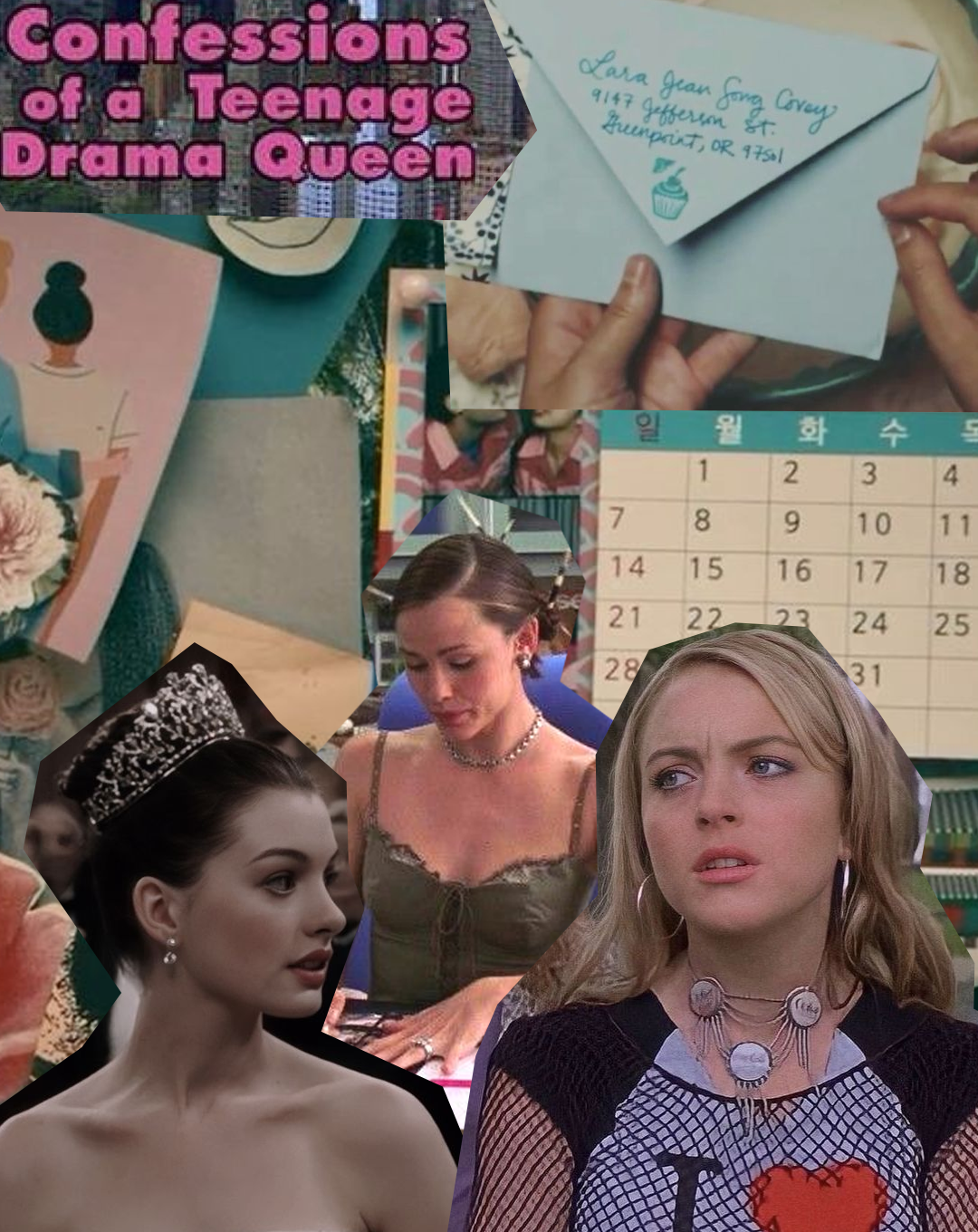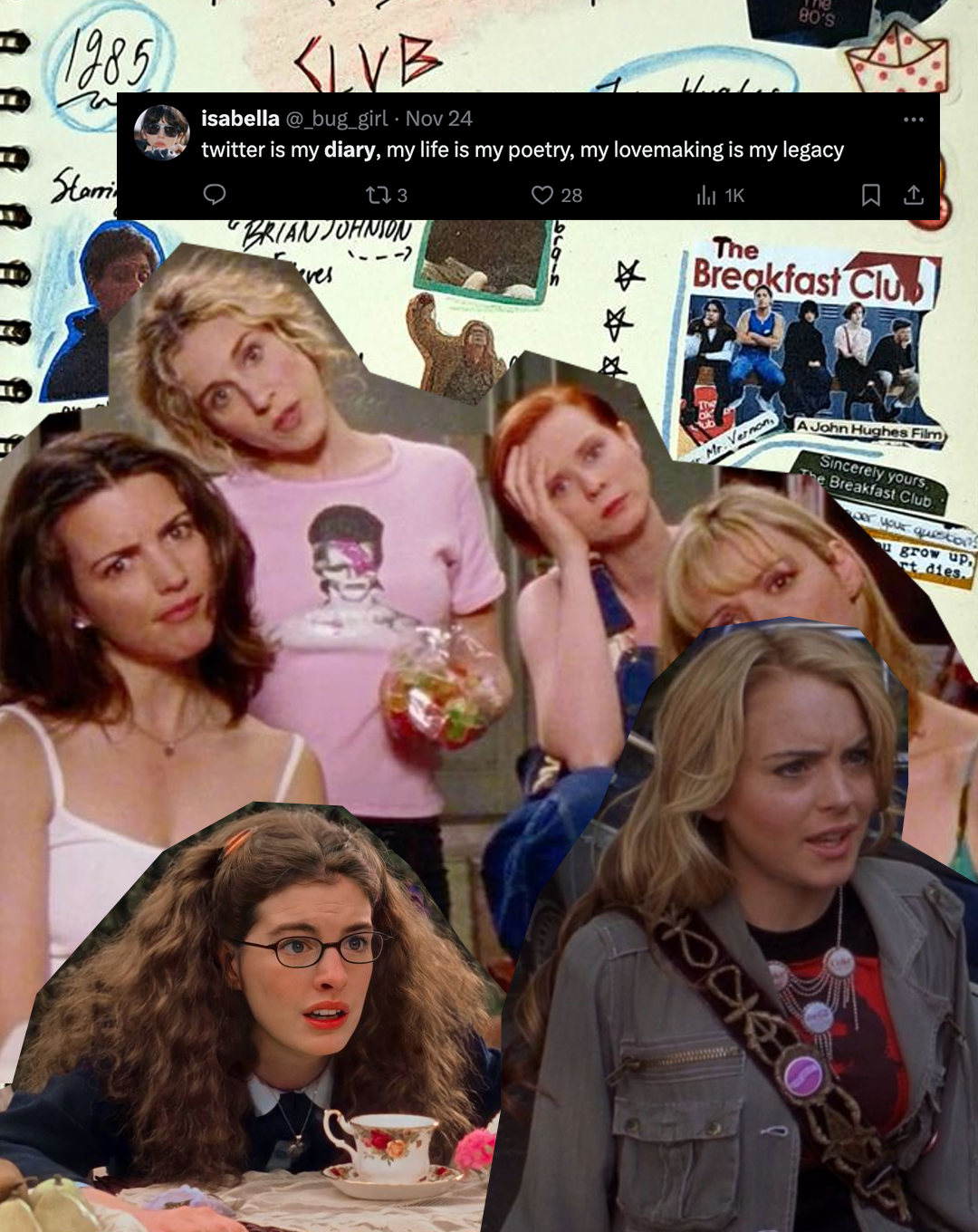On Drama Queens, Diary Girls and the Line Between Self Reliance and Isolation
Words: Ozge Sargin
Make it stand out
What do you picture when you imagine a teenage girl's bedroom? Band posters on the walls, clothes scattered on the floor, fairy lights, the usual. But what’s hidden, unseen but known, is the top drawer of the nightstand, where a diary with a small locket is kept like a secret. This isn’t just a Hollywood trope — think Mia Thermopolis’s diary in The Princess Diaries (2001), Lola’s narration in Confessions of a Teenage Drama Queen (2004), or Lara Jean’s letters in To All the Boys I’ve Loved Before (2018).
Girls have countless ways of keeping diaries: the one shared with friends, the one kept private, or the one signed by classmates at the end of the school year. Though diaries have become a business, with coloured tabs, voice activated locks, and plush exteriors, they remain one of the most intimate relationships in a teenage girl’s life.
In The Princess Diaries, Mia Thermopolis is overwhelmed by the responsibilities of becoming a princess, grappling with the identity shift needed to embrace her royal lineage and facing scrutiny from friends. Isolated in her struggle, she finds the courage to navigate this change after receiving her long-lost father’s diary. Similarly in To All the Boys I’ve Loved Before, Lara Jean Covey copes with her emotions by writing letters to her crushes rather than voicing her feelings. When her father admits he may have leaned on her too heavily after her mother’s passing, expecting her to mature too quickly, Lara Jean gradually steps out of her fantasy world and begins dating her first boyfriend.
Years prior, Confessions of a Teenage Drama Queen’s Lola Cep feels alienated after moving to a new city and school. Without a physical diary, she narrates her thoughts and fantasies as a way to escape into her own world, often dismissed as “too dramatic” by others, including her best friend. By the end, Lola’s song, “That girl was a wild child dreamer / But she'll find herself / 'Cause she believes in nothing else,” reflects how being "too dramatic" ultimately led her to rely only on herself.
In each of these stories, Mia, Lola, and Lara Jean are teenage girls with single parents, struggling to feel validated as they explore their individuality. Their diaries or inner narrations become safe spaces to process the scrutiny they face from friends and family. This relationship with their private world, materialised through the diary, reflects hyper-independence, showing how young women are taught to rely on themselves in a society that doesn’t fully support their self-expression.
“In this sense, young girls’ diaries become the only safe spaces where they can explore their true selves without external judgment, helping them manage an inner voice that often has to conform to external expectations.”
In a Different Voice by Carol Gilligan explains that girls develop a "relational" sense of self, often prioritising others' perspectives due to societal expectations. This isn’t a natural trait but a response to social conditioning - where girls are oriented to care for others and are under scrutiny at a time when self-experimentation should be celebrated. As Gilligan notes, "Sensitivity to the needs of others and the assumption of responsibility for taking care lead women to attend to voices other than their own and to include in their judgment other points of view.” In this sense, young girls’ diaries become the only safe spaces where they can explore their true selves without external judgment, helping them manage an inner voice that often has to conform to external expectations.
Gilligan contrasts the “dramatic” label often applied to girls' self-experimentation with the independence encouraged in boys. For boys, experiments in individuality are celebrated as markers of maturity, never “dramatic,” no matter how toxic the locker rooms get. For girls, however, crises and struggles are treated as chances for relational growth, fostering a self-concept centered on connection rather than individualism.
As Simone de Beauvoir wrote in The Second Sex, in Western society, men “is the Subject, he is the absolute — she is the Other,” women exist mostly in relation to male counterparts. Limited by everything external, young girls’ diaries become the only place where they can finally be the subject, the main character in their own story.
Diary-keeping in this context serves as a sanctuary where girls can process their own emotions, untangle relational conflicts, and validate their experiences when external support is lacking. It’s more than just a personal outlet; it’s a lifeline that helps them internalise and navigate the experience of being the ‘Other.’ Through this private space, they can process society's demands in a way that nurtures both self-expression and self-reliance.
However this level of sufficiency and the need to retreat into one’s inner world to be oneself on one’s own terms isn’t necessarily healthy. Portrayals of the “Diary Girl” archetype in media romanticise young women’s isolation, framing singularity as self-discipline. Diaries, then, are symbols of this unhealthy cultural isolation, presenting self-reliance as a "heroic" form of solitude, teaching young women to internalise and compartmentalise instead of seeking support. I used to call my diary 'the love of my life' growing up, and now I’m trying to overcome hyper-independence, realising that “only believing in myself” like Lola, might have been a coping mechanism for being labeled “too dramatic” - a moniker that has made too many women shrink away from self expression and into the pages of their journal.


